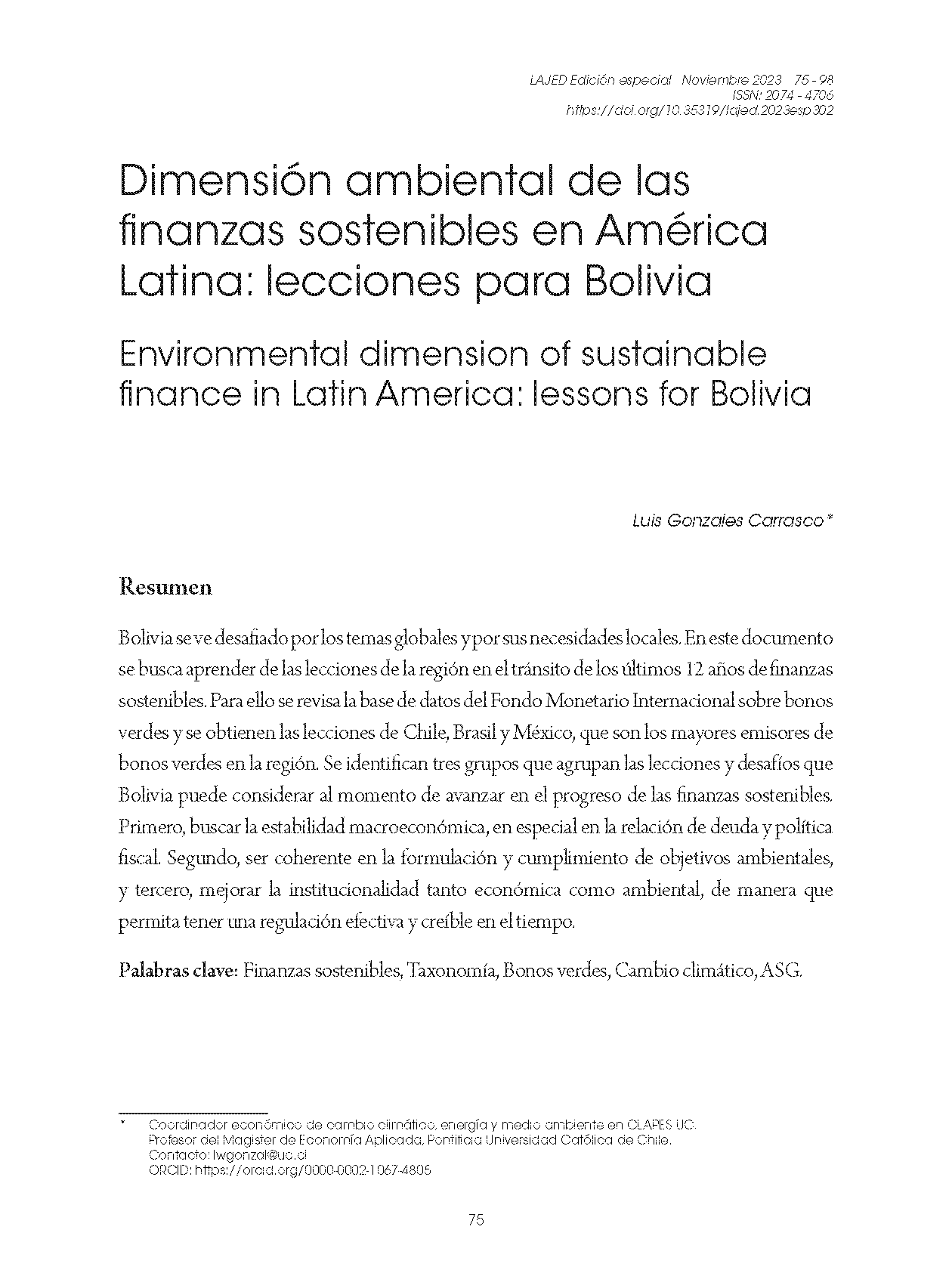Environmental dimension of sustainable finance in Latin America: lessons for Bolivia
DOI:
https://doi.org/10.35319/lajed.2023esp302Keywords:
Sustainable Finance, Taxonomy, Green Bonds, Climate Change, ESGAbstract
Bolivia is challenged by the global issues and by its local needs. This document seeks to learn from the lessons of the region in the transit of the last 12 years of sustainable finance. To do this, the International Monetary Fund’s database on green bonds is reviewed and the lessons of Chile, Brazil, and Mexico, which are the largest issuers of green bonds in the region, are obtained. Three groups are identified that group the lessons and challenges that Bolivia can consider when advancing in the progress of sustainable finance. First, seek macroeconomic stability, especially in the relationship between debt and fiscal policy. Second, to be coherent in the formulation and fulfillment of environmental objectives, and third, to improve both economic and environmental institutions that allow for effective and credible regulation over time.
Downloads
References
Autoridad de Supervisión del Sistema Financiero, ASFI (2022). Circular 749. Modificaciones al reglamento del registro de valores y a normativa conexa https://servdmzw.asfi.gob.bo/CircularValores/circulares/ASFI_749.pdf
Amacker, J. y Donovan, Ch. (2021). Marathon or Sprint? The Race for Green Capital in Emerging Markets. Centre for Climate Finance and Investment, Imperial College Business School.
Alfaro, J. y Cifuentes. A. (2023). On the Performance of Portfolios Based on ESG Ratings. The Journal of Impact and ESG Investing. DOI: 10.3905/jesg.2023.1.071
Bansal, R., Wu, D. y Yaron, A. (2018). Is socially responsible investing a luxury good? https://papers.ssrn.com/sol3/papers.cfm?abstract_id=3259209
Boitreaud, S., Emery, T., Gonzales, L., Gurhy, B., Larrain, F., Paladines, C. (2021). Paving the Path: Lessons from Chile’s Experiences as a Sovereign Issuer for Sustainable Finance Action. Equitable Growth, Finance and Institutions Insight. © World Bank, Washington, DC. https://openknowledge.worldbank.org/entities/publication/980dd320-2a81-5db5-abcc-d98ce638ea93
Céspedes, Á., Cossio, J. y Calle, A. (2018). Inclusión financiera y pobreza en Bolivia. Revista de Análisis del Banco Central de Bolivia, 29(2), 83-126.
Charlin, V., Cifuentes, A. y Alfaro, J. (2022). ESG ratings: an industry in need of a major overhaul. Journal of Sustainable Finance & Investment, 1-19. https://doi.org/10.1080/20430795.2022.2113358
Christensen, H. B., Hail, L. y Leuz, C. (2021). Mandatory CSR and sustainability reporting: Economic analysis and literature review. Review of Accounting Studies, 26(3), 1176-1248.
Cifuentes, A. (2020). Inversiones sustentables (ESG): mitos y realidades, verdades a medias y verdades incómodas. Documento de trabajo N° 72, CLAPES-UC.
Climate Bonds Initiative, CBI (2022) Estado del mercado en América Latina y el Caribe. https://www.climatebonds.net/files/reports/cbi_lac_2020_sp_02d_fv.pdf
Earth, F. O. T. (2018). The bigger picture: Brazil and China’s approach to sustainable finance. Medium. https://foeus.medium.com/the-bigger-picture-brazil-and-china-sapproach-to-sustainable-finance-5a43e797264d
European Comission (2023). Overview of sustainable finance. https://finance.ec.europa.eu/sustainable-finance/overview-sustainable-finance_en
Goel, R., Natalucci, F. y Gautam, D. (2022). Sustainable finance in emerging markets: evolution, challenges, and policy priorities. IMF Working Paper WP/22/182.
Gonzáles, L. E., Malky Harb, A., Bobka, S., Torrico, J. C., Antosiewicz, M., Mendizábal, C. y Espinoza, S. (2022). Impacto económico de las medidas de mitigación de las NDC de Bolivia. Revista Latinoamericana de Desarrollo Económico, (37), 45-86.
Gratcheva, E., Emery, T. y Wang, D. (2021). Demystifying sovereign ESG. Equitable Growth, Finance and Institutions Insight Washington, D.C.: World Bank Group. http://documents.worldbank.org/curated/en/842671621238316887/DemystifyingSovereign-ESG.
International Capital Market Association, ICMA (2021). Guía de los bonos sostenibles. https://www.icmagroup.org/sustainable-finance/the-principles-guidelines-andhandbooks/sustainability-bond-guidelinessbg/
International Monetary Fund, IMF (2023). Global Financial Stability Report: Safeguarding Financial Stability amid High Inflation and Geopolitical Risks. Washington, D.C., April.
Kehoe, T. J., Machicado, C. G. y Peres-Cajías, J. (2019). The Monetary and Fiscal History of Bolivia, 1960-2017. National Bureau of Economic Research, Working Paper N° 25523.
Korinek, A. y Kreamer, J. (2014). The redistributive effects of financial deregulation. Journal of Monetary Economics, 68 (S), 55-67.
Mian, A. R., Straub, L. y Sufi, A. (2020). The saving glut of the rich. National Bureau of Economic Research, Working Paper N° 26941.
Mian, A. y Sufi, A. (2018). Finance and business cycles: The credit-driven household demand channel. Journal of Economic Perspectives, 32(3), 31-58.
Qian, R. (2012). Governance and strong institutions are key in assessing default probability: why do some countries default more often than others? The role of institutions. Policy Research Working Paper Series, N° 5993, The World Bank.
Rompotis, G. G. (2023). Do ESG ETFs “Greenwash”? Evidence from the US Market. The Journal of Impact and ESG Investing , 3(4), 49-63.
Steffen, B. (2020). Estimating the cost of capital for renewable energy projects. Energy Economics, 88, 104783.
Tolliver, C., Keeley, A. y Managi, S. (2021). Policy targets behind green bonds for renewable energy: Do climate commitments matter? Science Direct, 157, 120051

Downloads
Published
How to Cite
Issue
Section
License
Copyright (c) 2004 Revista Ciencia y Cultura

This work is licensed under a Creative Commons Attribution-NonCommercial 4.0 International License.





